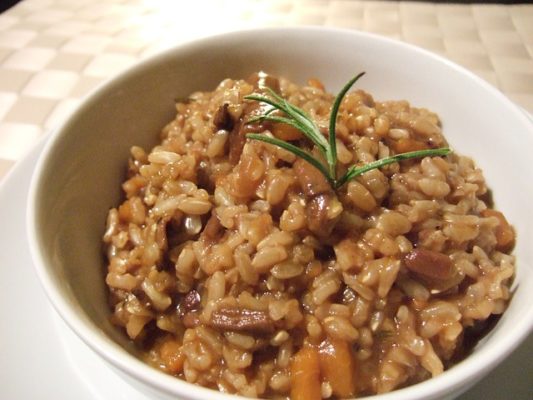 Contrary to many dog-owners beliefs, our cute furry companions are not carnivores anymore. Over time, they have evolved to be omnivorous, being able to eat a wide array of foods that fall under many different food categories. Among these would be foods rich in grains and starch, such as brown rice.
Contrary to many dog-owners beliefs, our cute furry companions are not carnivores anymore. Over time, they have evolved to be omnivorous, being able to eat a wide array of foods that fall under many different food categories. Among these would be foods rich in grains and starch, such as brown rice.
As brown rice does not sound like the first idea that would arise when thinking of what to feed your dog, there are a multitude of benefits to be seen from its consumption.
Studies have shown that ancestors of modern dogs had been fed food consisting of grains and starch, which was a crucial step in the development of their modern diet. Now, dogs can see the nutritious benefits of brown rice through responsible feeding from their owners!
Health Benefits of Brown Rice
As tiny of a meal supplement as it may seem, brown rice is a highly nutritious food that packs tons of carbohydrates, minerals and vitamins.
The B Vitamins in it help the enzymes in your dog’s body operate efficiently, while also assisting their coat, skin and heart health. In addition, B Vitamins boost their immune system to function more properly.
Being rich with fiber, brown rice in your dog’s diet can help lower cholesterol, assist in healthy bowel movements, and help deter the formation of blood clots.
Minerals found in brown rice include Iron and Selenium. Iron, helping the flow of oxygen in their cells, and Selenium, boosting their immune system, will work together to enhance the liveliness of your furry companion.
Through intake of brown rice, your dog can help reduce the emergence of risks such as obesity, diabetes and high cholesterol.
Safely Feeding Your Dog Brown Rice
As a main principle, never feed your dog uncooked rice. The hard rice and rougher than necessary texture will likely lead to improper digestion, while concurrently not allowing all of the minerals and vitamins to leach to your dog’s body.
Cooking rice through the use of a microwave or boiling water will allow the rice to become softer and more easily digestible. Never add spices or herbs to the rice, as this would be a non-necessary component.
As always when feeding your dog a new food, start off slow and small! An excess amount before their body is properly adjusted to it can lead to an upset stomach. Never let your dogs rice consumption take up over ten percent of their daily diet.
Rice, as a stand alone meal, should be avoided. Slowly adding a small amount of rice to their daily or nightly meals would be more preferred, as it can act as a nutritious supplement, helping digestion through the fibers it contains, as well as adding key minerals and vitamins to their meal.
White Rice vs. Brown Rice
The question inevitably comes in to play; would brown rice or white rice be safer for my dog?
Well, the simple answer is both, but this would be a result of how your dog reacts to it. White rice is stripped of its bran and some nutrients, which makes it a bit easier for your dog to digest, but they would be missing out on some key vitamins and minerals that brown rice has to offer.
Sometimes, the texture of brown rice may make it hard for them to swallow properly and digest, but this is not a very common issue. Both brown rice and white rice are good supplements to assist in your dog’s gastrointestinal movements, so either could be beneficial in that instance.
The only way to truly know which one your dog may like or react to better would be to try out both ! On one day, feed them a small amount of cooked brown rice, than on another, a small amount of cooked white rice. Track your dog’s reaction and following bowel movements, and you will be able to hone in on which version of rice may be more appropriate.
Conclusion
So…yes! It is certainly safe to feed your dog brown rice, under careful supervision and feeding through considerate and healthy amounts. Brown rice is packed with carbohydrates, minerals and vitamins that will assist in the healthiness and quality of life your furry companion. Remember, always cook the rice before serving, never add spices, only feed in small amounts, and observe how your dog reacts to it! More than likely, they will love eating it, and you, as their owner, will love seeing the health benefits they will be experiencing!
Sources
Wong, Cathy. “Why Are B Complex Vitamins Important to Your Health?” Verywell Fit, Verywell Fit, 6 July 2019, www.verywellfit.com/b-complex-vitamins-89411.
Szalay, Jessie. “Brown Rice: Health Benefits & Nutrition Facts.” LiveScience, Purch, 2018, www.livescience.com/50461-brown-rice-health-benefits-nutrition-facts.html.
Cardiff, Emily. “Oats and Brown Rice: Healthy Whole Grains Your Dog Can Eat.” One Green Planet, One Green Planet, 24 Feb. 2014, www.onegreenplanet.org/animalsandnature/oats-and-brown-rice-healthy-whole-grains-your-dog-can-eat-2/.

Hi, I am Andrew. I am the editor at FamilyWithPets. I am enjoy learning and sharing information about pets that helps enrich the lives of pets and pet parents.
